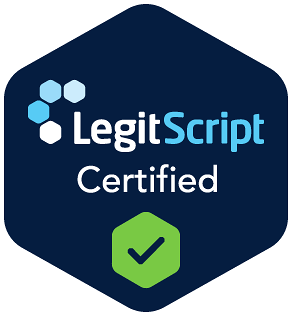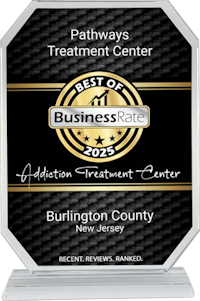Rehab for Cocaine
Addiction in Burlington, New Jersey
Cocaine is a powerful stimulant that affects the central nervous system, leading to a temporary increase in energy, alertness, and euphoria. But cocaine use can lead to serious health issues such as heart attacks and respiratory failure. The drug’s impact on the brain’s reward system also fosters dependency, making it difficult for users to quit without professional help.
Our rehab for cocaine addiction in Burlington, New Jersey is essential for those looking to break free from the drug’s grip. We provide addiction treatment programs personalized to meet each individual’s unique needs. By combining evidence-based practices with compassionate care, Pathways Recovery helps individuals reclaim their lives and achieve long-term recovery.
- Frequent Nosebleeds: Often caused by snorting the drug, which irritates and damages the nasal passages. This is a common physical symptom indicating regular use.
- Dilated Pupils: A common effect of stimulant use, indicating high levels of drug activity. Persistently large pupils might be a sign of cocaine use.
- Rapid Weight Loss: Cocaine suppresses appetite, leading to significant and unhealthy weight loss. This sudden change can be a red flag.
- Insomnia: Difficulty sleeping or experiencing disrupted sleep patterns is often due to the stimulant effects of cocaine. Chronic insomnia can further deteriorate overall health.
- Increased Heart Rate: Cocaine use often causes an elevated heart rate, which can lead to cardiovascular problems over time.
- Intense Cravings: Cravings for cocaine can dominate daily life and decision-making.
- Neglecting Responsibilities: Addiction can lead to ignoring or failing to fulfill obligations at work, school, or home. This neglect can have long-term consequences for one’s career and personal life.
- Financial Problems: Spending excessive amounts of money on drugs often leads to debt or economic instability.
- Social Withdrawal: Withdrawing from friends and family can conceal drug use or because of changes in social behavior. This can exacerbate the addiction and hinder recovery efforts.
- Risky Behaviors: Engaging in dangerous or illegal activities, such as theft or selling possessions, to obtain or use cocaine is a definite sign of cocaine addiction.
Recognizing these signs and seeking rehab for cocaine addiction can provide the necessary support and structure to overcome this challenging condition, leading to a healthier and more stable life. Reaching out for professional help can make a significant difference in the recovery journey, providing tools and strategies to regain control and rebuild a fulfilling life.
The Difference Between Crack and Cocaine
While crack and cocaine are chemically similar, both powerful stimulants derived from the coca plant, their effects and methods of use differ significantly. Both substances carry a high risk of addiction and can lead to severe mental health issues and physical deterioration, making their use extremely dangerous and life-threatening.
Cocaine typically appears as a white powder and is usually snorted or injected, producing a rapid but short-lived high that lasts 15 to 30 minutes. It stimulates the central nervous system, leading to increased heart rate and blood pressure, which can result in cardiovascular issues such as heart attacks and strokes. Prolonged use of cocaine can also cause severe neurological damage, seizures, and mental health problems like paranoia, anxiety, and depression, with a high risk of addiction.
On the other hand, crack is a crystalline form of cocaine that is smoked, resulting in an almost immediate and intense high lasting about 5 to 10 minutes. The rapid onset of effects due to smoking leads to severe respiratory issues, such as chronic cough and lung damage, as well as a quick and intense addiction cycle. Crack users often experience severe paranoia, hallucinations, and rapid physical decline that includes severe weight loss and dental problems.

Effects of Prolonged Cocaine Use
Cocaine places a significant strain on the heart and blood vessels, which can lead to an increased risk of heart disease and stroke. The stimulant effect of cocaine raises blood pressure and heart rate, which can damage the cardiovascular system.
Prolonged snorting or smoking of cocaine can cause significant damage to the lungs and nasal passages. Snorting cocaine can lead to chronic nosebleeds, loss of sense of smell, and severe damage to the nasal septum. Smoking cocaine can cause respiratory distress, a chronic cough, and an increased risk of respiratory infections.
Cocaine’s neurotoxic effects can impair cognitive function and lead to memory loss. Long-term use can result in decreased attention span, difficulty with decision-making, and an overall decline in cognitive abilities. This neurological damage is often irreversible and can severely impact the quality of life.
Extended cocaine use can significantly increase the risk of developing mental health disorders such as anxiety, depression, and paranoia. Users may experience severe mood swings, agitation, and a general decline in mental well-being. Those with pre-existing mental health disorders should seek out dual diagnosis treatment so their mental health is taken into account.
Prolonged cocaine use can result in serious mental health problems, such as psychosis. Users may experience symptoms such as paranoia, hallucinations, and delusions, which often resemble the symptoms of schizophrenia. These psychotic episodes can be extremely distressing and may require medical intervention to manage.

When Should Someone Seek Professional Help For Cocaine Addiction?
You should seek professional help for cocaine addiction if you struggle to quit despite wanting to or notice it impacting your daily responsibilities, relationships, or health. If you experience withdrawal symptoms when you try to stop or require more cocaine to feel an effect, this is a sign of addiction. Ignoring these signs can lead to further deterioration of physical and mental health, strained relationships, and potentially dangerous or illegal activities.
Medical treatment and therapeutic interventions may be necessary to address both the addiction and any co-occurring mental health conditions. Professional treatment programs offer a comprehensive approach that significantly increases the chances of a successful recovery. With the guidance of healthcare providers and addiction specialists, individuals can receive medical assistance to manage withdrawal symptoms and access support to build up a life that promotes long-term sobriety. This comprehensive care significantly increases the chances of successful recovery and improves overall well-being.
Options for Rehab for Cocaine Addiction
Recovering from cocaine addiction requires a comprehensive treatment approach. Pathways Treatment Center offers several options to support individuals on their journey to recovery, including:
Many individuals struggling with cocaine addiction also suffer from mental health disorders such as depression or anxiety. Dual-diagnosis treatment addresses both conditions simultaneously, providing a more holistic approach to recovery.
Sober living homes offer a supportive, substance-free environment for individuals transitioning from intensive treatment back into everyday life. These homes provide a structured and supportive setting that helps residents maintain their sobriety while building life skills and healthy routines.
Also known as MAT, this philosophy of treatment uses medications alongside counseling and behavioral therapies to treat substance use disorders. This approach can help manage withdrawal symptoms, reduce cravings, and increase the likelihood of sustained recovery.
These programs offer flexible treatment options that allow individuals to receive therapy and support while continuing to live at home and maintain their daily responsibilities. Outpatient programs typically involve regular therapy sessions, group counseling, and educational workshops.
A PHP treatment is ideal for individuals who need a higher level of care than standard outpatient programs but do not require 24/7 supervision. Participants typically attend treatment sessions for several hours a day, several days a week, while returning home in the evenings.
An intensive outpatient program (IOP) is designed for individuals who need more support than standard outpatient treatment but less supervision than a partial hospitalization program. IOP typically involves multiple weekly therapy sessions, including individual counseling, group therapy, and family therapy. This program allows individuals to receive intensive support while maintaining some degree of normalcy in their daily lives.
Each of these options is designed to provide the necessary support and resources for individuals to overcome cocaine addiction and build a foundation for long-term recovery.
Heal From Cocaine Addiction at Pathways Treatment Center
Pathways Treatment Center in Burlington, New Jersey provides a safe and supportive environment for those battling cocaine addiction. Our experienced professionals offer personalized treatment plans, including detoxification, counseling, and aftercare support. We emphasize the importance of addressing the underlying causes of addiction and developing healthy coping mechanisms to ensure long-term recovery.
If you or a loved one is struggling with cocaine addiction, contact us today to start your journey toward healing and a healthier, drug-free life.



